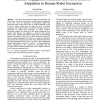Free Online Productivity Tools
i2Speak
i2Symbol
i2OCR
iTex2Img
iWeb2Print
iWeb2Shot
i2Type
iPdf2Split
iPdf2Merge
i2Bopomofo
i2Arabic
i2Style
i2Image
i2PDF
iLatex2Rtf
Sci2ools
ICRA
2005
IEEE
2005
IEEE
Operator Engagement Detection and Robot Behavior Adaptation in Human-Robot Interaction
- It has been shown that in human-robot interaction, the effectiveness of a robot varies inversely with the operator engagement in the task. Given the importance of maintaining optimal task engagement when working with a robot, it would be immensely useful to have a robotic system that can detect the level of operator engagement and modify its behavior if required. This paper presents a framework for human-robot interaction in which operator's physiological signals were analyzed to infer his/her engagement level and the robot behavior was adapted as a function of the operator affective state. Peripheral physiological signals were measured through wearable biofeedback sensors and a control architecture inspired by Riley's original information-flow model was developed to implement such human-robot interaction. The results from affect-elicitation tasks for human participants showed that it is possible to detect engagement through physiological sensing in real-time. A teleoperati...
| Added | 25 Jun 2010 |
| Updated | 25 Jun 2010 |
| Type | Conference |
| Year | 2005 |
| Where | ICRA |
| Authors | Pramila Rani, Nilanjan Sarkar |
Comments (0)

